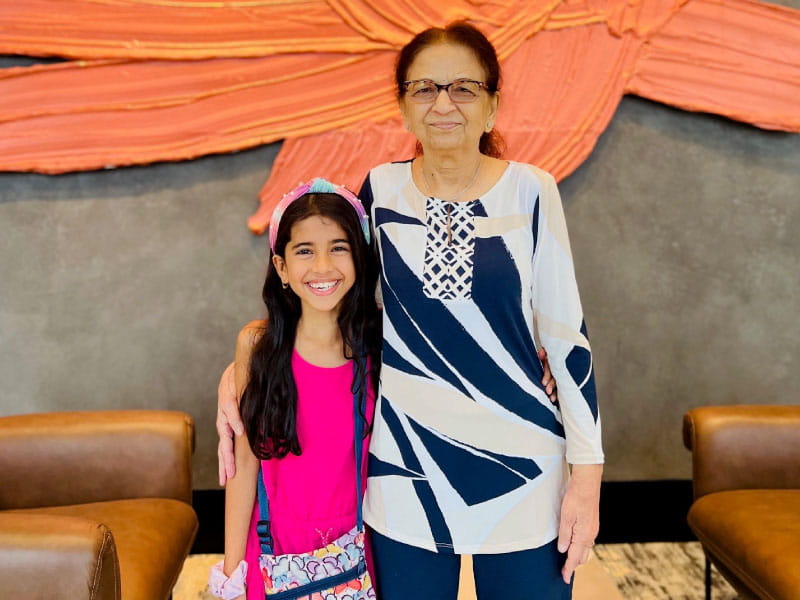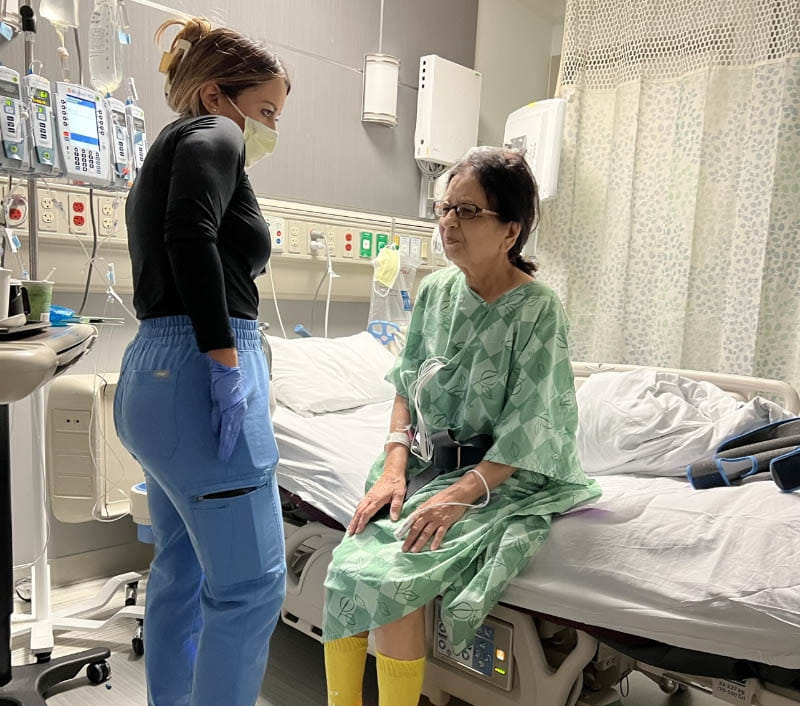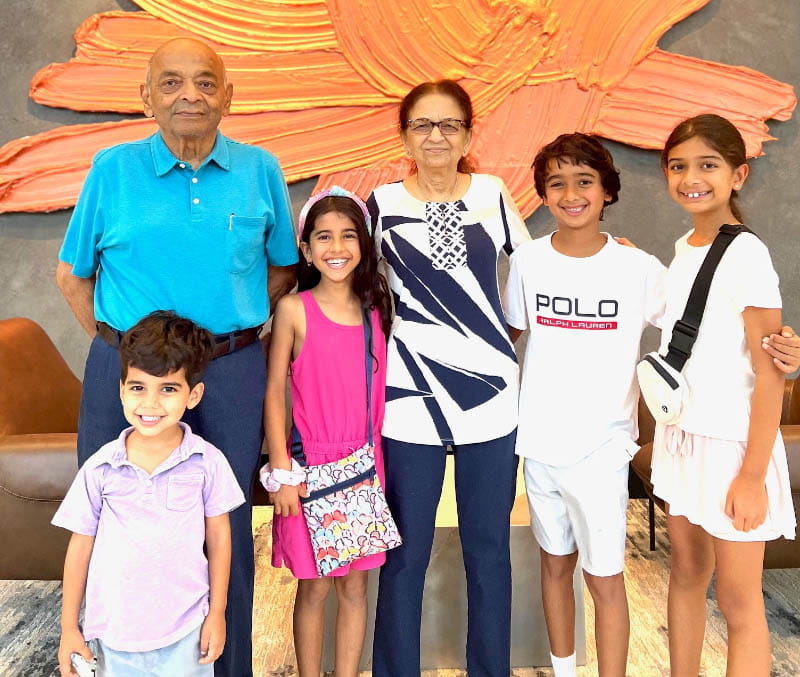During a stroke, her doctor son got her quick care, then her granddaughter penned a story
By Deborah Lynn Blumberg, American Heart Association News

Rekha Desai planned to play Legos and blocks with her 2-year-old grandson, Kaveh, as she watched him in his Atlanta home.
But Rekha never arrived. Instead, the 73-year-old lay in a gurney thousands of feet in the air after having a stroke.
A helicopter raced Rekha to a hospital that could perform a specialized procedure. Her son, Dr. Dhaval Desai, drove 20 minutes to meet her. His wife, Dr. Yogita Tailor, also a doctor, waited nervously at home with Kaveh and their daughter, Kaiya.
"Will Dida be OK?" Kaiya asked about her grandmother, or dida, her best friend and cooking and slumber party partner.
Yogita hugged Kaiya and hoped the answer would be yes.
Rekha's medical drama started in July 2022 when her son asked her to watch Kaveh while he worked so Yogita could take Kaiya to a friend's birthday party.
That morning, Yogita called Dhaval at the hospital.
"Your mom isn't feeling well," she said. "She doesn't think she should watch Kaveh."
Rekha was dehydrated and vomiting. Yogita speculated that her mother-in-law had a stomach bug.
Dhaval wasn't overly concerned. With his mother's small stature, vegetarian diet and "go, go, go" attitude, it wasn't unusual for her to get weak from not eating or drinking enough. Still, he left work to go check on her.
He found her in bed. Dhaval took her blood pressure. It was normal. A COVID-19 test was negative. He gave her water and saltines and nausea medicine.
Soon after, Rekha vomited again. The room was spinning.
"Something's not right," said Dhaval, who works in internal medicine and pediatrics. "We're going to the ER."
"No," Rekha said. "I'll drink more water and hydrate."
But Dhaval wouldn't take no for an answer. He called a colleague in the ER. "We're on our way," he said.
Rekha got IV fluids and nausea medicine and had bloodwork done. Still, she felt nauseous. She got a different nausea medicine. But it didn't agree with her. She twitched and writhed in bed until it wore off.
A CT scan didn't show any bleeding or a tumor, though the doctor noticed calcium deposits in blood vessels in the back of her brain.
Still, "stroke was the last thing on my mind," Dhaval said. Rekha didn't have any of the classic signs: face drooping, arm weakness or slurred speech.
Rekha met with her doctors, his colleagues. One suggested a CTA scan of Rekha's head and neck. It's a more specialized test that combines a CT scan with a dye to create pictures of blood vessels and tissues.
Dhaval agreed. Rekha's doctor said she'd call in a few hours with results. It's not going to show anything, Dhaval told himself. He went home to change and check on the kids.
Less than an hour after Dhaval arrived home, his phone rang.
"Your mom had a cerebellar stroke," the doctor said. This meant Rekha's stroke affected her cerebellum, the part of the brain that controls movement. It was caused by a blood clot in her brain. The doctor said she may need a thrombectomy, a time-sensitive procedure to remove the clot.
Their hospital wasn't equipped to perform the procedure. Rekha needed to be flown to a hospital that could.
"I don't want a procedure," Rekha told Dhaval on the phone. "I don't want to go in a helicopter."
Dhaval conferenced in his brother, Seemal Desai, who is a doctor in Dallas. Their father got on the phone, too.
"You have to," they told her. "You need to do this."
The main helicopter had a two-hour delay. "I was in near tears," Dhaval said.
With more work, he found a helicopter to transport her right away.
At the new hospital, doctors determined a thrombectomy was too risky because of where the clot was located. They gave her medication to thin her blood in hopes it would dissolve the clot.
Doctors said they didn't think the plaque in her artery was due to cholesterol, as can be the case. Dhaval suspects his mother's stroke was related to having had COVID-19 six months prior. His uncle, Rekha's brother, died from a post-COVID-19 stroke.
At first, Rekha had trouble with her peripheral vision. She was unstable walking.

Five days later, Rekha was strong enough to go home. She needed help bathing and dressing. For three months, she did occupational and vocational therapy.
Exercises helped Rekha graduate from her walker. Therapists took her to a grocery store to make sure she could shop on her own. They assessed her driving ability, too, and cleared her to drive, though she avoids highways. She takes a daily blood thinner.
"Sometimes I have little memory lapse, but I'm 99.9% fine now," Rekha said. "And it's because of the instant reaction on my son's part that I'm here today."
The reaction was Dhaval in doctor mode. The rest of the time he was in son mode, which proved to be eye-opening.
"It was frightening and stressful being on 'the other side,'" he said.
While her dida was hospitalized, Kaiya worried.
She called to check on her. She made a card Dhaval delivered.
During Rekha's recovery, Kaiya was eager to help. One day, when Rekha had a dizzy spell, Kaiya ran to bring the walker.
"She was always there," Rekha said. "She wanted to make sure I was safe."
"I'm not too little to help," Kaiya said more than once. She bought a word search book to help Rekha with her letters.
Dhaval called Kaiya "a little coach on the sidelines always helping."

Nine months after her dida's stroke, Kaiya, who's now 7, decided to write a book about what happened. She sat down with crayons and markers, drew pictures, then wrote words.
Kaiya's teacher, Tiffany Churchwell, helped her piece together and bind the book, "My Life: Dida and the Stroke." Kaiya read the story to her classmates and filmed a reading.
"I have a wild story to tell you," she wrote. Then, "I was so scared!!!" Finally, she wrote about how excited she was that her dida was coming home.
"What inspired you to write this story?" a classmate asked Kaiya after the reading.
"I want people to see how I solved my problems," she answered. "Maybe this can help them or give them ideas on how to solve their own problem."
Stories From the Heart chronicles the inspiring journeys of heart disease and stroke survivors, caregivers and advocates.





